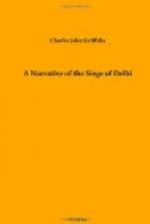The mutineers of the 3rd Light Cavalry from Meerut had entered Delhi on May 11, crossing the Jumna by the bridge of boats, and, being joined by the city scoundrels, first wreaked their vengeance on the European residents who lived close by, and who, without any previous warning of the terrible fate in store for them, fell easy victims to the murderers. It made our blood run cold, when visiting the ruins of these houses, to think of the dastardly crimes which had been committed in and around the spots on which we were standing. Defenceless and unarmed, helpless in the hands of these human tigers, our unfortunate men, women, and children were immolated without mercy. Turning back, we entered the city by the Calcutta Gate, and walked along the ramparts by the riverside, past the walls of the magazine, till we reached the Water bastion. Here the destructive effect of our batteries during the bombardment was most apparent. Fired at the distance of only 180 yards, the guns had smashed the walls and ramparts to pieces, huge fragments had rolled down into the ditch, and the cannon in the battery were completely dismounted from the carriages, lying in confusion one on top of the other.
At the Kashmir Gate there was a heap of goods (consisting principally of clothes and rubbish) many feet high, which had been looted from the houses around. The guard at the gate had orders to allow no one to pass out with a bundle of any kind; and the consequence was an accumulation of material, chiefly worthless, which covered many square yards of ground. I have omitted all record of the plundering which up to this time, and for long afterwards, took place all over the city where our troops had penetrated. This account I have reserved for the last chapter, where full details of the loot of Delhi and the amount of prize-money accruing to the force will be found. September 21.—During the 21st I, in company with other officers, wandered over the heart of the city, continuing our perambulations south of the Chandni Chauk and penetrating into streets beyond, where the six days’ fighting had taken place. The night before we had heard occasional shots fired at no great distance, and these were continued during the day and for some time afterwards.
Looting was going on to a great extent, both European and native soldiers engaging in the work; and though strict orders had been issued to prevent such licence, it was found impossible to check the evil. The shots emanated from these men, who, of course, went about well armed, and brooked no interference when in the act of securing booty. Altercations of a serious nature had taken place between the Europeans and Sikh soldiers, ending sometimes in blows, and often in bloodshed, when the two parties met in a house or were busy employed in dividing the spoil. However, in time, when most of the native troops had left Delhi, and the European regiments were quartered in walled enclosures with a guard at the gates to prevent egress, the looting on the part of the private soldiers ceased, and the prize agents were enabled to gather in the enormous wealth of the city without any trouble.




